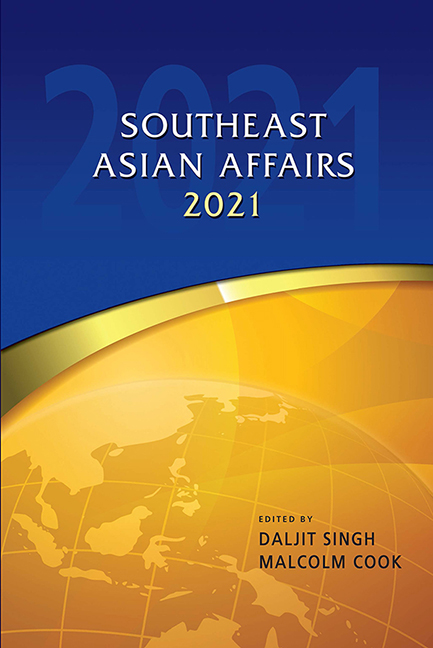Southeast Asia in 2020: Economic and Social Hardship, and Strategic Strain
Published online by Cambridge University Press: 09 October 2021
Summary
In 2020 the COVID-19 pandemic hit Southeast Asian states hard. From a health perspective, the region has managed the pandemic comparatively well, with fewer reported cases and deaths as a percentage of the population than other parts of the world. But measures applied to stem the spread of the disease have caused a deep economic contraction in the region, seen rises in unemployment and poverty, strained already fragile governmental institutions, and in some cases created political instability. There are further variations within the region, depending on levels of trade dependency, state capacity and the stringency of control measures implemented by national governments. For the vast majority of states, minimizing the health impacts and pulling through the depths of the economic recession caused by the virus has become the immediate and top priority that dominates all others.
Beyond these domestic coronavirus challenges, ASEAN member states experienced a sharp deterioration in their external strategic environment in 2020 as the already tense relationship between the United States and China became even more hostile and confrontational. From March 2020 onward, the Trump administration accelerated its campaign against a range of Chinese Communist Party (CCP) policies and diplomatic narratives. It placed the blame for the global calamity squarely on the CCP, alleging a cover-up by party officials about the source of the outbreak and citing the failure of China's leaders to respond rapidly to quarantine the local outbreak, to urgently close internal and international borders, or to disclose key information about the infectiousness and severity of the virus to the World Health Organization and the world. It doubled down on criticisms of Chinese trade and investment practices, its political influence over the World Health Organization, and human rights issues in Hong Kong and Xinjiang. The Americans also implemented policies and laws to limit the capacity of Chinese companies to dominate high technology sectors of the world economy.
For its part, the CCP has displayed an acute insecurity and defensiveness of its competence, right to rule and global standing and it has gone on the attack against all forms of domestic and international criticism. It has done so through a mixture of “wolf-warrior” diplomacy, economic coercion against critics like Australia, and further clamping down on sources of internal dissent.
- Type
- Chapter
- Information
- Southeast Asian Affairs 2021 , pp. 3 - 21Publisher: ISEAS–Yusof Ishak InstitutePrint publication year: 2021

